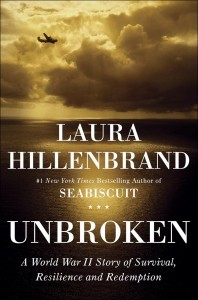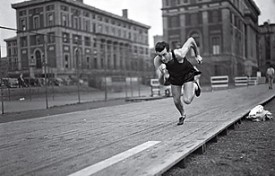I really enjoy this new Kindle that I was given for my birthday by my parents! In fact, I like it so much that I have been reading more as of lately, therefore not much blogging–no apologies, though!
The first book I downloaded (in the van on the way back from Empowered Youth) had just come out the previous day, I believe. It was Decision Points by former President George W. Bush. I appreciated the format and writing style of the book, but was not all that impressed with it. If I were to give it an “Amazon” style star rating, it would probably be a “4.” However, as I was finishing up Decision Points, I heard of a new book that had just been published and released a few days before, and was already on many “Best Books of 2010” lists, and quickly became a bestseller.
Now, I usually don’t just fall for a book just because it is a bestseller. In fact, many bestsellers are worthless in my eyes. I figure what literary critics often like, I will not. Yet, the premise of this book attracted me. It is was titled Unbroken: a World War II Story of Survival, Resilience, and Redemption by Laura Hillenbrand. I read the brief synopsis of it, and figured I would give it a whirl. “Why not,” I thought. “With a Kindle, if it is worthless, I didn’t fork over much for it anyway.”
 I delved into the true story quickly (probably too quickly) last Monday, the sixth of December. The story is of an Italian American named Louis Zamperini. I had never heard of him before purchasing the book. He was born into a lower middle-class family of immigrants in 1917, near New York City. When Louis was a baby, the Zamperini family moved to southern California, near Los Angeles, and as he grew, he became the town rascal. He would steal anything he could, take on any other boy his age, and get even with anyone who stood in his way. Everyone knew he would be in the juvenile hall before he was even grown. All of the police in Torrence, California knew exactly who “Louie” Zamperini was. His older brother Pete, though, invested everything to turn his little brother around. Louie’s brother and parents decided to make him into an athlete: specifically a runner.
I delved into the true story quickly (probably too quickly) last Monday, the sixth of December. The story is of an Italian American named Louis Zamperini. I had never heard of him before purchasing the book. He was born into a lower middle-class family of immigrants in 1917, near New York City. When Louis was a baby, the Zamperini family moved to southern California, near Los Angeles, and as he grew, he became the town rascal. He would steal anything he could, take on any other boy his age, and get even with anyone who stood in his way. Everyone knew he would be in the juvenile hall before he was even grown. All of the police in Torrence, California knew exactly who “Louie” Zamperini was. His older brother Pete, though, invested everything to turn his little brother around. Louie’s brother and parents decided to make him into an athlete: specifically a runner.
At first, Louie hated anything to do with athletics and running; but soon, he gave in and began to love running. He would train constantly, and soon became the fastest high school mile-runner in the state, and within a year, the country. In just four years since beginning running, he was an Olympian at the 1936 games in Berlin (where the Nazis had recently come to power, and Hitler the Chancellor). Louie was still a rascal though: he decided he was going to steal the Nazi flag from Hitler’s home. He was caught stealing the flag, but the guards never knew that he still had the flag stuffed in his clothes.
When the United States entered World War II, Louie reluctantly joined the Air Force–reluctant because he was disappointed he couldn’t run in the next Olympics in Tokyo, which was obviously cancelled. Over a great series of events, his plane went down in the Pacific Ocean, where he survived for well over a month on a six foot long life raft. Nearly starving to death, he and the other survivor, pilot Russel Phillips miraculously spotted land. Unfortunately for them, though, they were picked up by an enemy Japanese ship before they could reach the island.
From that point on, Louie and Russel’s lives would be absolute misery. They were constantly starved, experimented on, and beat to a pulp. One guard, knowing Louie as a famous runner, singled him out, and found nearly every way to beat him nearly daily. Louie, with ever bit of pressure around him to succumb to the beatings, starvation, and abuse by losing his sense of patriotism and pride, never once broke down in front of his captors. He was convinced that if he did, he had betrayed himself and his country. As the war drew on, the abuses grew even worse, wearing on Louie physically and emotionally. With death all around him, it all became hopeless when the rumor spread that the Japanese, losing the war badly, would kill all prisoners of war on a certain date. Just days before that date, two atomic bombs were dropped on the Japanese homeland, ending the war, and giving freedom to the surviving POWs. Louie came out “unbroken.”

He was a national hero. But in his mind, the war had only just begun. Every single night, his captors appeared in his dreams, constantly beating him. He began to drink heavily, knowing it as the only way to dull the emotion and stress. He began to hate his captors so much that he knew the only way to rid himself of them in his mind was to go back to Japan and seek revenge. His new wife could no longer handle the drinking, and within a few years of marriage, she sought a divorce.
Then the most miraculous thing happened–Louie’s wife was invited to see an evangelist preach at a city-wide crusade. When she came back she said she had been born again, and would no longer seek a divorce. Louie thought that was great, but for sure did not like the religious part of it. All of the sudden, his wife had “religious” friends around her constantly, and would always try to persuade him to go to an evangelistic service. Finally he agreed. He heard the preacher, Billy Graham, talk of sin, hell, and forgiveness, and Louie wanted to part of it. He left even more mad at God. He drank himself to sleep that night, along with that came yet another nightmare of him getting beat up. The next night, his wife bugged him again to attend the service. He flat out refused. Just to see his wife happy, though, he said he might just go–just as long as she promised he could leave as soon as the preacher told everyone “to bow their heads, close their eyes, and with no one looking around.”
Louie was convicted the entire message of his sin, boiling inside with so much hatred of everything. When the time of the invitation came, he got up to leave. As he stepped into the aisle near the back row where he and his wife were sitting, he came to the greatest realization in his life: everything he had suffered and survived through was to wake him up to his need for a Savior. He broke down, went to the altar, and accepted Christ as his redeemer. That very evening, he went home and emptied his great collection of liquor bottles and cigarette packs: he was done with his old life. He was a Christian now. From then on, after five and a half years of constant nightmares and depression, he never once had a nightmare or bout of depression again. Also, instead of the most severe hatred of his captors, he felt nothing but love for their souls. He soon returned to Japan to meet as many of the prison guards as he could. Many, he personally led to the Lord. The story could not have ended any better.
Though not even written as a Christian book; as a Christian, I can see the truth in it all. His whole life, Louie could be broken by no one: not even the most violent men in the world. Yet, when he came home, he nearly broke himself by alcohol and depression. Then Christ broke him of his pride and hate, making him whole. From then on, Louie Zamperini was truly Unbroken.
…I imagine that you all can tell just how much I enjoyed reading Unbroken. I think I finished all 500 pages in a week. For those of you that think this is probably just a typical war story, it is everything but that. It is exactly as the subtitle states: …a story of survival, resilience, and redemption.
